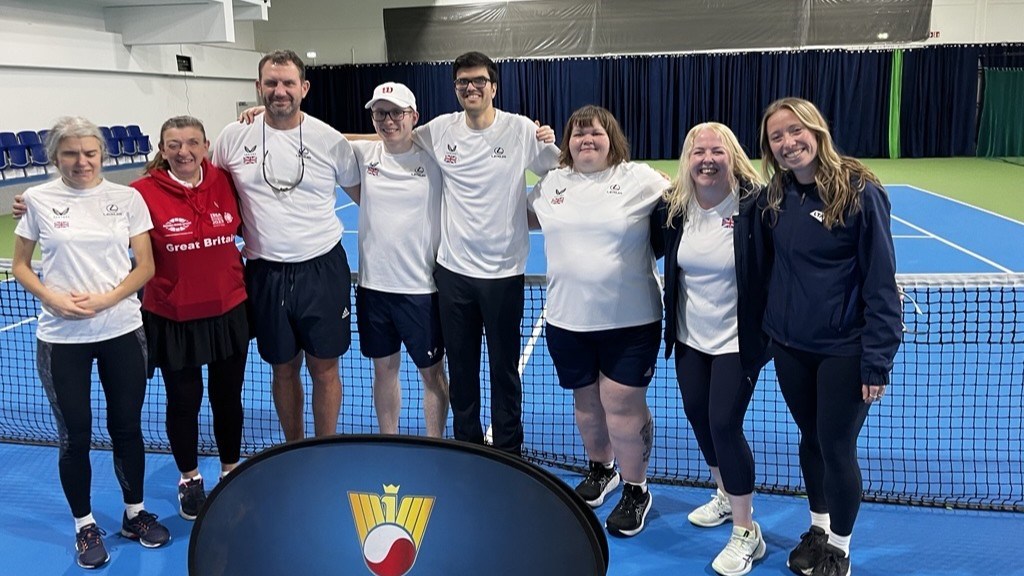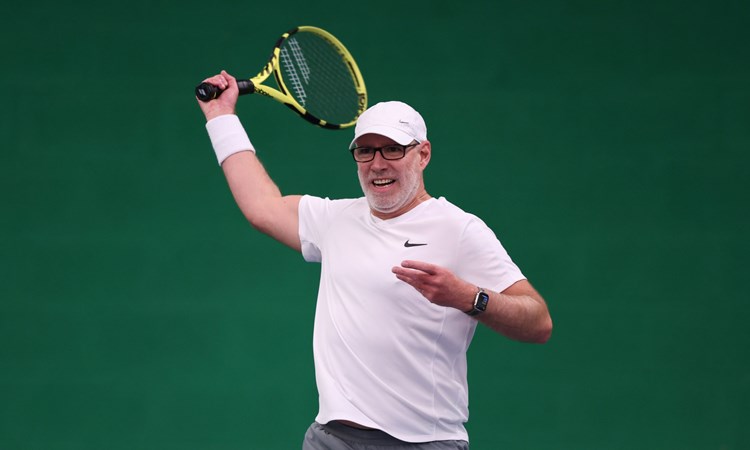
Double gold for Great Britain at the 2025 IBTA European Championships
• 3 minute read
Great Britain's visually impaired (VI) tennis team served up some memorable moments at the 2025 IBTA European Championships, with two gold medal-winning performances the highlight of a thrilling week of action in Kozerki, Poland.
Hertfordshire’s Ivan Rodriguez Deb was triumphant in the B4 men’s singles, as he secured victory after losing just one game across his three matches in the round robin phase and went on to beat compatriot Ewan Hayward in the final.
There was also gold medal success for the pairing of Rosie Pybus and Hayward in the B4 mixed doubles, as the duo added to their collection of medals at major championships by beating the Polish duo of Kataryzna Antczak and Jaroslaw Skarzynski in a tight final.
Rodriguez Deb also picked up a bronze medal in the mixed doubles event, as he teamed up with Germany’s Charlotte Schwagmeier to claim a medal after losing against Pybus and Hayward in the semi-finals.
Pybus and Hayward claimed silver medals in their singles events, while there was a silver medal for Naqi Rizvi in the men’s B1 men’s singles category and Yvette Priestley secured a silver medal after a run to the final of the B1 women’s singles.
The British duo of Neil Balmforth and Andrea Logan also performed well, as they just missed out on a medal in the mixed doubles B3, with eight athletes in total representing Britain in Kozerki.
Middlesbrough’s Pybus has been a shining star of the Great Britain VI team in recent years and she reflected with pride on her latest medal achievements.
“What an incredible journey at the European Championships 2025 in Poland,” said Rosie. “It was a privilege to compete alongside so many talented athletes and to be part of an event that truly inspires. From the intensity of the competition to the camaraderie between players, coaches, supporters, organisers and volunteers - every moment will stay with me.
“Becoming the inaugural B4 mixed doubles Champions alongside my brilliant partner Ewan Hayward, and securing silver in the B4 ladies singles - amongst a field of ever-improving athletes and players brand new to the international stage - was nothing short of incredible.
“The journey to Poland wasn’t straightforward. In the lead-up to the championships, I experienced a severe flare-up of spinal stenosis nerve pain that put my ability to compete in serious doubt. But with a mix of resilience, stubbornness, and sheer determination, I was able to step onto the court - and not only play, but exceed all of my expectations.
“This wouldn’t have been possible without the unwavering support and expertise of my former tennis coach Hannah Stockton, my new coach Jen Barron, the constant powerhouse that is my Personal Trainer, Nicky Francis and Kate Chesser, who has revolutionised the mental edge in my game.
“A huge thank you to the organisers and my sincerest thanks also go to Sophie Hall and the LTA for their incredible support, guidance, and belief throughout this journey.
“To everyone who made this championship so special - the fellow competitors, coaches, volunteers and support from home - thank you for the energy, respect and encouragement that made it unforgettable. I’m excited for what comes next.”
Pybus’ partner Hayward also reflected on a special week, as he said: “The European Championships were an incredible experience. The competition was at a very high level, which made it all the more rewarding to get the gold in the B4 mixed doubles and silver in B4 singles for Great Britain. A big thank you to everyone who has supported us and visually impaired tennis, especially the LTA.”
The format of VI tennis varies based on the set sight categories that the players compete within. Depending on a player’s category, they may have up to three bounces of the ball before they return it to their opponent.
In the B1 category, for those having the greatest degree of sight loss or no sight, three bounces of the ball are allowed, players typically wear eye masks and there are tactile lines on the court. B2, B3, B4 and B5 categories are contested by players with different degrees of partial sight, with B2 players allowed three bounces, B3 players allowed two bounces and B4 and B5 players allowed one bounce of the ball.
Play visually impaired tennis
Inspired by Great Britain’s success? Find out more about visually impaired tennis and how to get involved.





